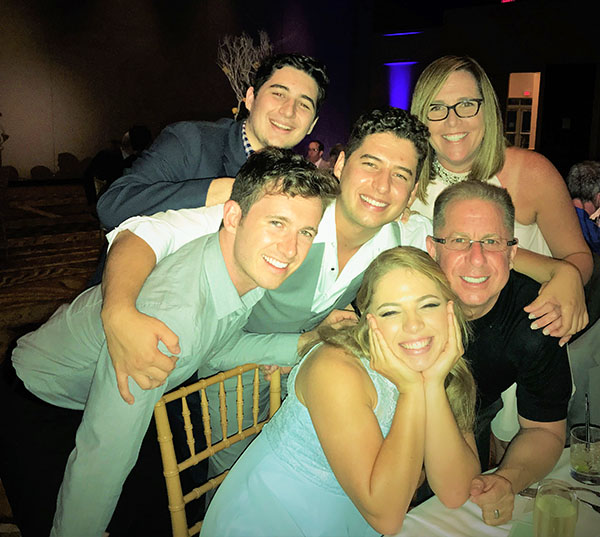Susan Rabinowitz is a longtime resident of Wellington. She is a credit risk executive with Bank of America and lives in the community with her husband and four children. Rabinowitz is also on a mission to educate others on the importance of accepting people as they are, especially when it comes to those in the lesbian, gay, bisexual and transgender (LGBT) community.
Two of Rabinowitz’s sons — 26-year-old Tyler and 19-year-old Daniel — are gay. She learned how to create a safe space for her children at home by being an advocate in her workplace.
“I would like people to know that, even in 2019, there are many people we interact with in our daily lives at work, at home, in the community, who have challenges that differ than from mainstream,” Rabinowitz said. “There are many people in the LGBT community who are still afraid to share their true selves. What we need to do as a community is to figure out ways to educate everyone about the LGBT community. They need a voice that can be heard among us. No one deserves to walk around and be ashamed of who they are for fear of not being accepted.”
Her son Tyler didn’t tell his parents he was gay until he was 23 years old. For many years, he kept it hidden as a secret because he was aware that many people may not accept him, even fearing he may not be accepted by his own family.
“I am a mother of four children,” Rabinowitz said. “My first son who came out to us didn’t come out until he was 23 years old. Shortly after, my other son had the courage to come out, and also a nephew.”
This was something that surprised Rabinowitz because she felt that she was already a supporter of LGBT rights.
“During that period of time, I had already become an ally of the LGBT community through an employee network group at our bank, and I started to become an ally for other reasons,” Rabinowitz said. “I was having conversations with others having challenges in the workplace, and then having the experience that I was having at home; my two worlds collided in a way, that after some self-reflection, it didn’t feel good.”
Clearly, Rabinowitz thought, she had not done enough.
“I had no idea that I was not creating an environment that would be inclusive, loving and safe for my own child to be his true authentic self in his home,” she said. “I started to educate myself on the challenges of the LGBT community, and it was important that I started to become more of an advocate with a voice.”
Rabinowitz wants the general public to step outside of their normal circles. Step out into someone else’s world to learn about inclusion and diversity. Creating a safe place for someone who is having challenges creates an opportunity to understand these challenges and help in a positive way.
“If you can educate yourself with a group of people who are not like you, even if you don’t personally identify as LGBT, but you’re interested in the challenges they are facing in the workplace, or at home, then this is when the real work happens,” Rabinowitz said.
Bank of America has created inclusion by encouraging networking. When Rabinowitz was networking, she was networking with women just like herself. The shift in her awareness came when she began networking with people unlike herself, and she became aware of the challenges they may face in the workplace or at home.
“Our bank has always supported diversity and inclusion,” Rabinowitz said. “The culture and the environment are to bring your whole self to work. We want all voices heard at the table and have always encouraged that approach. There are several employee networking groups that are set up so you can find a group that you self-identify with, but also join to understand how a group may have challenges. This way, the groups can learn how to grow and thrive.”
What can the general public do to encourage inclusiveness? Rabinowitz thinks it’s important to have meaningful discussions. It is also important to get to know LGBT people.
“We have luncheons, we have panel discussions,” Rabinowitz said. “We are having courageous conversations. The bank is sponsoring events so that we can talk about the things that we need to talk about.”
What are some challenges in the workplace?
“If I am heterosexual, and I don’t know much about the LGBT community, and I walk up to a group of people, and we are talking about a bank event, I may ask someone I know who is also heterosexual who they are bringing to the event,” Rabinowitz explained. “If I know someone is gay or bisexual, and I don’t know the right word to use, you just don’t ask them. So, they don’t tend to go to the bank events with their partners as comfortably as the one’s you are actively engaged with. So, this is one example of the difference. If you are an ally, you proactively want to get to know the LGBT community.”
For more information about local LGBT resources, visit www.compassglcc.com.









[…] Bank Exec Susan Rabinowitz Also An LGBT Ally Changing Minds Town-Crier […]